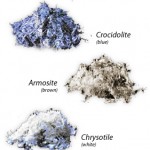THIS INFORMATION IS PROVIDED AS A COURTESY. THE HOME INSPECTION WILL NOT TEST FOR ASBESTOS OR OTHER ENVIRONMENTAL HAZARDS.
WHAT IS ASBESTOS?
The term asbestos actually refers to a group of 6 mineral fibers that occur naturally in rocks and soil. From an industrial perspective, asbestos offers some incredible strength and heat resistant properties. The different types of asbestos have long been combined with other materials to strengthen or otherwise improve a vast range of products from brake pads to roof shingles.
HEALTH & COST CONCERNS
If made airborne, asbestos can lead to serious health implications. Mesothelioma is a disease that is caused specifically by exposure to asbestos. It’s important to note however that the presence of undisturbed asbestos in the home does not pose a serious health concern. Click here to read how the CPSC recommends dealing with asbestos found in homes.
If disturbed, asbestos has the ability to break down into especially small microscopic fibers. The fibers are so tiny that, unlike many other debris, they do not agitate the skin or cause immediate coughing. These fibers can enter the lungs and embed into lung tissue. Excessive exposure to airborne asbestos fibers can lead to asbestosis or mesothelioma.
If you are considering remodeling or demolishing areas of a home, agencies like the EPA and OSHA may require the affected areas to be identified for Asbestos Containing Materials (ACMs). While undisturbed asbestos does not pose an immediate health concern, special considerations during future remodels or demolition may increase the cost of those projects.
WHEN WAS ASBESTOS BANNED?
Contrary to popular belief, asbestos is still used in many countries including the US (click here to see where it is banned). Asbestos is still a component in a variety of industries and materials including:
- Automotive and industrial brake pads and clutches
- High temperature insulation
- Particulate filters
- Roofing shingles
- Fireproofing
- Gaskets
Regulations on the use of asbestos are continually tightening over the years. In the US, the EPA attempted to issue an asbestos ban in 1989 that was overturned in 1991. While newer homes often have no substantial amounts of Asbestos Containing Materials (ACMs), homes built before the late 70′s are more likely to have made use of asbestos during construction.
IS ASBESTOS IDENTIFIED IN THE INSPECTION?
If you live in, or are considering purchasing a home built before the late 1970′s there’s an increased chance that asbestos was used in some of the building materials that are not as likely to contain asbestos today. The only way to absolutely know if a product contains asbestos is to have a sample tested under a microscope at a lab (see “Testing for Asbestos” below). While the home inspection does not involve testing for asbestos, the report may identify items that are more likely to contain asbestos as a courtesy. Some common construction materials that often (but not always) contain asbestos include:
- Acoustic “popcorn” ceiling texture
- Water pipe insulation (old style)
- Ceiling tiles
- 9″ floor tiles and mastic
- Furnace duct tape (old style)
- Vermiculite insulation
If you would like to know more about which items may contain asbestos, be sure to ask your inspector at the time of inspection.
TESTING FOR ASBESTOS
To know for certain if a product contains asbestos it must be tested. This can often be done by bringing a small sample to the local lab. Many labs also offer on site services and can offer additional tests such as air contamination. Sample testing of a single layer that is brought to the lab usually runs between $50 and $80. Results are usually available within 24 hrs.
Here’s an example of a few Seattle area labs:
NVL Laboratories, Inc.
4708 Aurora Ave North, Seattle, WA
http://www.nvllabs.com
(206) 547-0100
Environix
2027 196th St SW, Suite A101, Lynnwood, WA
https://www.environix.com
(425) 563-6480
Seattle Asbestos Test
4500 9th Ave NE #300, Seattle , WA
http://www.seattleasbestostest.com
(206) 633-1111
Please note that the information and resources provided here are intended only as a courtesy by Wil Harnecker and HAUS Inspection Services, LLC.. This information is not intended for use in making real-estate or other financial or health related decisions. Further research and due diligence is always recommended during all steps of the home buying and selling processes.

